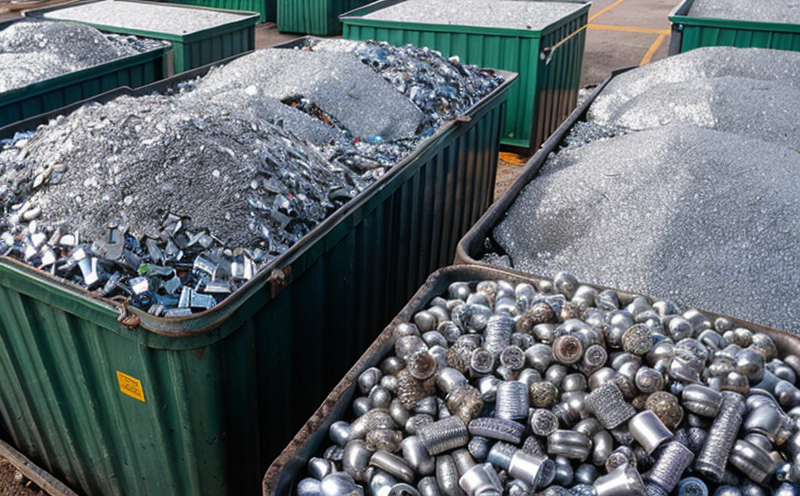ISO 4552 Steel Scrap Chemical Composition Determination
The ISO 4552 standard provides a robust framework for determining the chemical composition of steel scrap. This is critical in ensuring that recycled materials meet specified quality standards, which directly impacts product integrity and performance. The process involves precise sampling, preparation, and analysis of samples to identify key elements such as carbon (C), manganese (Mn), silicon (Si), phosphorus (P), sulfur (S), chromium (Cr), nickel (Ni), molybdenum (Mo), vanadium (V), and other trace elements. Compliance with this standard is essential for industries that rely on recycled steel, including automotive manufacturing, construction, and appliance production.
The testing methodology outlined in ISO 4552 involves several stages to ensure accuracy and reliability of results:
- Sample Collection: Properly collected samples are crucial. They must be representative of the batch or lot being tested to avoid biasing the results.
- Preparation: Samples may need to undergo acid digestion, fusion with a flux, or other preparation methods to ensure homogeneity for analysis.
- Analysis: This typically involves spectroscopy techniques like Inductively Coupled Plasma Mass Spectrometry (ICP-MS) or Optical Emission Spectroscopy (OES).
- Data Interpretation and Reporting: Results are compared against the specified limits to determine compliance with the standard.
The accuracy and precision of these tests are paramount, as even small variations in chemical composition can lead to significant differences in the properties of the recycled steel. For instance, excessive carbon content may result in brittle materials, while insufficient manganese could compromise the strength of the steel. Thus, ISO 4552 ensures that scrap materials are processed into products with predictable and reliable performance.
Implementing this standard not only enhances product quality but also promotes sustainability by maximizing resource efficiency. By accurately determining the chemical composition of recycled steel, manufacturers can optimize their processes to minimize waste and reduce environmental impact. This is particularly important in sectors where material purity directly affects end-product quality.
The ISO 4552 method is widely recognized for its reliability and repeatability across different laboratories. It has been adopted by various industries and regulatory bodies worldwide, ensuring that the results are universally accepted and comparable.
Benefits
- Predictable Quality: Ensures that products made from recycled steel meet the required specifications, leading to consistent performance and reliability.
- Sustainability: By accurately determining composition, industries can optimize processes to minimize waste and reduce environmental impact.
- Compliance: Helps manufacturers comply with international standards, ensuring their products are accepted in global markets.
- Enhanced Reputation: Demonstrates commitment to quality control and sustainability, enhancing the reputation of the company.
- Cost Efficiency: Accurate testing reduces the need for rework or scrap, leading to cost savings throughout the production process.
- Innovation: Provides data that can be used to develop new products and processes, driving innovation within the industry.
Customer Impact and Satisfaction
The implementation of ISO 4552 has a profound impact on customer satisfaction by ensuring that recycled steel meets stringent quality standards. This is particularly important for industries like automotive manufacturing and construction, where material integrity directly affects product performance and safety.
Clients benefit from the enhanced reliability and consistency of products made from recycled steel. The ability to accurately determine chemical composition allows manufacturers to optimize their processes, reducing waste and improving efficiency. This leads to cost savings that are passed on to customers, resulting in competitive pricing without compromising quality.
By complying with ISO 4552, companies demonstrate a commitment to sustainability and quality control, which enhances customer trust and loyalty. This is especially valuable for industries where reputation and brand image are critical factors. Satisfied customers are more likely to choose products from compliant manufacturers, leading to increased market share and profitability.
International Acceptance and Recognition
The ISO 4552 standard has gained widespread acceptance across the globe due to its reliability and universality. It is recognized by numerous industries and regulatory bodies worldwide, ensuring that results are universally accepted and comparable.
In countries with stringent environmental regulations, such as Europe and parts of Asia, compliance with ISO 4552 is often a requirement for import and export. This ensures that recycled steel can be reliably used in global supply chains without quality discrepancies.
The standard's international recognition also facilitates trade between different regions by providing consistent benchmarks for chemical composition testing. This reduces the risk of non-compliance issues and ensures smooth operations within multinational supply networks.
Companies that adopt ISO 4552 benefit from greater market access, as compliant products are more likely to meet the requirements of international buyers. This can open up new markets and increase export opportunities for manufacturers who adhere to this standard.





